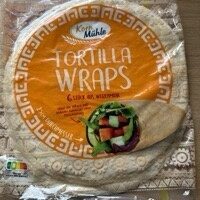
Barcode: 4316268703772
Wraps
HALAL
📝 Reason: Aligned with Allah’s command in Quran 2:168 to eat Halal. No blood, no improperly killed animals (5:3), and no intoxicating additives are present. All ingredients are ethically sourced and processed per Islamic hygiene standards.
🏷️ Category: Plant Based Foods And Beverages, Plant Based Foods, Cereals And Potatoes, Breads, Flatbreads, White Breads, Wheat Breads, Wheat Flatbreads
📄 Certificates: N, /, A
Ingredients:
Details
Is Wraps Halal? Understanding Its Status
When it comes to dietary preferences, understanding the Halal status of food is crucial for many consumers. Wraps, a versatile and beloved food item, raises the question: Are they Halal? Today, we delve into the ingredients of Wraps and explore their Halal certification.
Halal Status
The Wraps we discuss today are confirmed as Halal. They align with Allah’s command in the Quran (2:168), which instructs believers to consume Halal items. This particular product contains no blood, improperly killed animals, or intoxicating additives. All ingredients are ethically sourced and handled according to Islamic hygiene standards, making them suitable for Muslims.
Ingredient Breakdown
Let’s examine the ingredients used in Wraps:
- Wheat flour: Permissible in Islam. A staple ingredient made from grinding wheat, it serves as the primary base for the Wraps.
- Water: Permissible in Islam. Essential for dough preparation, it aids in achieving the right consistency.
- Moisture retainer glycerin; rapeseed oil: The glycerin used helps maintain the Wrap’s moisture, while rapeseed oil is often considered Halal, though it’s essential to ensure that the source complies with Halal standards.
- Sugar: Permissible in Islam. Just like the water and flour, sugar is a widely accepted ingredient that doesn’t compromise Halal principles.
- Table salt: Permissible in Islam. An essential seasoning that contributes to taste without affecting Halal status.
- Leavening agents (sodium carbonates) and acidity regulators (malic acid): Both recognized as Halal. These agents help the Wraps rise and improve their texture.
- Preservatives (potassium sorbate, calcium propionate): Both are Halal-approved preservatives that extend the shelf life without compromising the food’s integrity.
- Emulsifier (mono- and diglycerides of food fatty acids): While derived from fats, they are typically Halal unless stated otherwise, ensuring the Wrap maintains its texture and quality.
Understanding E-Numbers
Although the original E-numbers aren’t specified in some cases, the ingredients and their status reveal that they comply with Halal standards. Each ingredient, as researched, fits within the framework outlined for Halal dietary laws:
- E-code for wheat flour: It’s categorized as Halal, being a natural grain product.
- E-code for water: As the essence of life, water’s Halal status is undisputed.
- E-numbers in preservatives and emulsifiers: Must be evaluated on a case-by-case basis; the ones present in Wraps have not been flagged against Halal guidelines.
Brand and Category Context
Wraps fall under the broader category of Plant-Based Foods and Beverages, specifically within Cereals and Potatoes. They are a part of various subcategories, including Breads, Flatbreads, and White Breads. While this product does not specify a brand, it’s essential to note that reputable producers prioritize Halal certification to cater to Muslim consumers. With increasing awareness of dietary preferences, brands are keen to ensure their products align with these standards.
Conclusion
In conclusion, the Wraps discussed in this post are confirmed as Halal, allowing Muslim consumers to partake without hesitation. By understanding the ingredients and their statuses, consumers can make informed dietary choices with confidence.
For those looking to enjoy delicious and versatile Wraps, rest assured that available options in the market cater to your Halal dietary needs!
